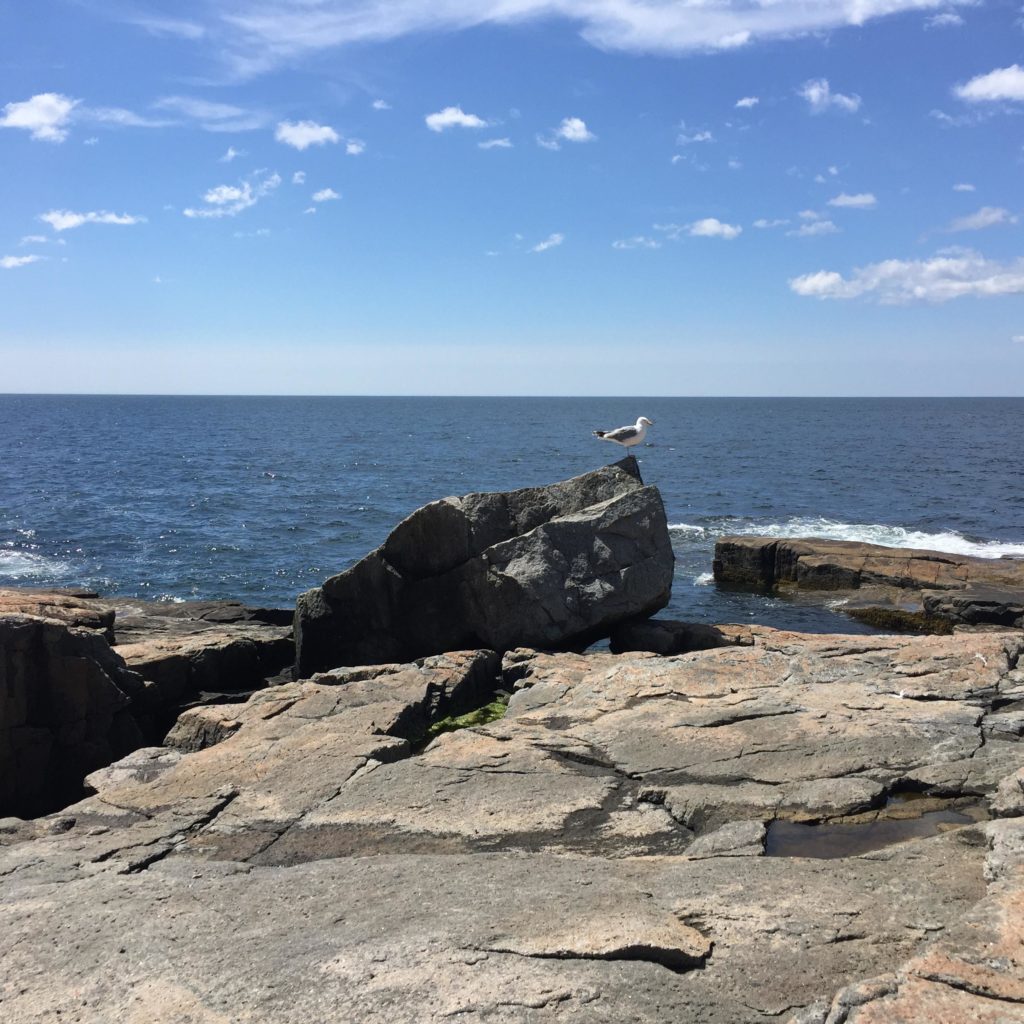 This summer I fell in love with the rocky coast of Maine. Sitting on a boulder at Schoodic Point listening to squawking gulls chase after lobster boats in the bay pushed me into aesthetic bliss. For a moment I closed my eyes to absorb more deeply. My inner peace was shattered when a stranger yelled to her friend, “Look! Are those porpoises? Yes, there they go again!” It was all too perfect for this Texan, who fears the heat of June through August, to sit in the sun on a gorgeous, 70-degree day in July.
This summer I fell in love with the rocky coast of Maine. Sitting on a boulder at Schoodic Point listening to squawking gulls chase after lobster boats in the bay pushed me into aesthetic bliss. For a moment I closed my eyes to absorb more deeply. My inner peace was shattered when a stranger yelled to her friend, “Look! Are those porpoises? Yes, there they go again!” It was all too perfect for this Texan, who fears the heat of June through August, to sit in the sun on a gorgeous, 70-degree day in July.
Something happened to me in Maine that I want to explore. Maine now has a claim on me. I think about it frequently and look forward to returning next summer if not sooner. When stressed, I also find that I go to my happy place that now resembles the scene I described above. I am struggling to explain to myself why this has happened to me.
I used to like the social exchange theory for emotions that simplifies complicated feelings into three responses to the deals we receive. If we get less than we require, we feel angry or sad. If we receive more than our share, we feel guilty. If we get what we need we feel content or happy. This theory would suggest that I would feel guilty since I received so much more than I anticipated. My actual experience was bliss in the presence of such beauty. I don’t know if social exchange theory allows for bliss, which seems to be so much more than happiness but without the guilt.
Lest you think that my perception is overly romanticized, I can easily list a host of things I did not like about Maine. The water was too cold for Texans to enjoy. We visited several sandy beaches, but most of the shoreline was rock. Maine is one of the poorest states. Seafood is expensive for what you get. Often it is cold and rainy, even in the summer. I’m sure I could continue but you get the point. It was not paradise. I have visited Hawaii, which is much closer to perfection. Hawaii did not affect me as profoundly. I need another theory to help me understand why I can’t get Maine out of my mind.
Years ago I studied Gadamer’s ideas on epistemology. From his theory, the scene I described is not responsible for my inner bliss. Instead, Gadamer might have suggested that I could have seen the very same scene and been thinking about how much money this trip cost or any other distracting thoughts. He observed that sometimes, but not all the time, we are ready for beauty or meaningful encounters. He called this phenomenon a convergence of horizons. For instance, we could walk past a painting, a person, or a scene and experience no effect. But sometimes we are open and ready for an encounter and then something exciting happens. I like this theory because it does not mean that the scene I saw created my bliss. The scene played a significant part of my experience, but just as importantly, I had something to do with the encounter. I was ready, open and available to allowing something to enter my spirit or psyche.
Let me back up to let you know what preceded this encounter that had such an effect. I had spent several weeks on retreat with a two-year spiritual direction program I was completing. In those two weeks our group of 40 people intently listened to God and each other. My soul was permeable by the time I flew home, met my wife, and headed off for our camping trip in Maine. I believe that this preparation of quiet listening had as much to do with my experience as did the scene on the rocky coast of Maine. I can say this with a degree of confidence because I have had other profound experiences that came immediately after a silent retreat. In fact, after any retreat of more than a week, my psyche is wide open and receptive of the amazing gifts for us in nature, people, and art.
Have you had an encounter that made such a claim on you?
What practices do you have that prepare you to be open and ready to receive these experiences?
Dave Scheider is the Director of the Loise Henderson Wessendorf Center for Christian Ministry and Vocation at Seminary of the Southwest. Prior to joining the faculty of Seminary of the Southwest, Dave served as an Army Chaplain for 25 years.

